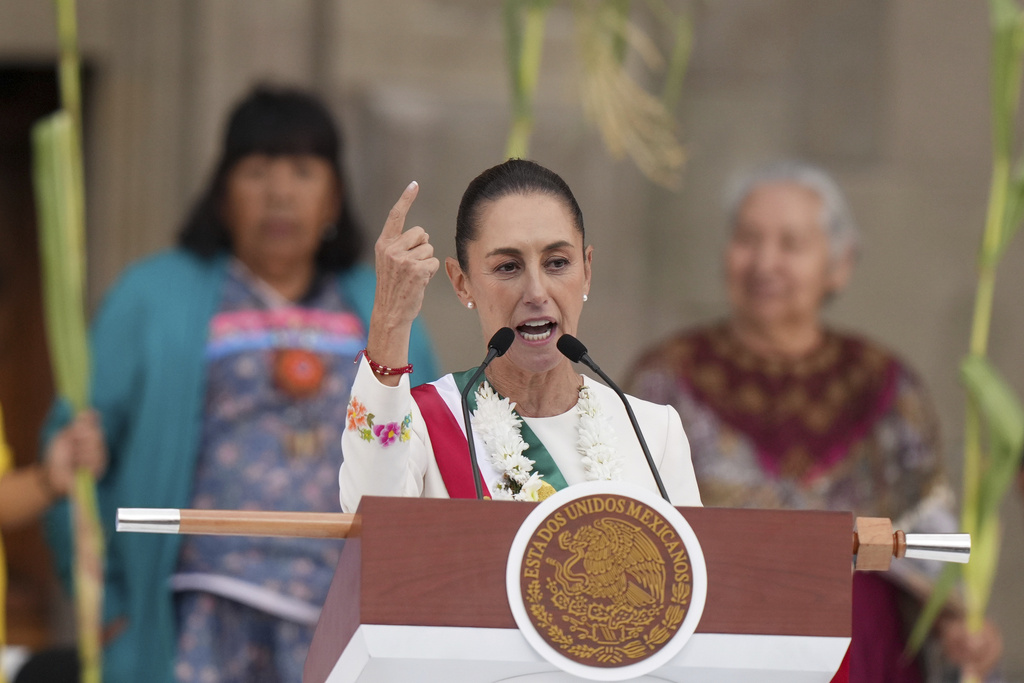Mexico’s President Hits Back At Trump Threat With Fiery Letter, Blames U.S. For Arming Criminals

AP Photo/Fernando Llano, File
Mexican President Claudia Sheinbaum pulled no punches on Tuesday when she sent her reply to President-elect Donald Trump’s threat of a sweeping 25% tariff on her country unless she stops illegal immigration and drug trafficking into the U.S.
Sheinbaum made clear in her letter that she believes the flow of immigrants crossing illegally from Mexico into the U.S. has already been greatly reduced and that the fentanyl crisis in the U.S. is fueling the drug cartel violence in Mexico.
She also said that Trump’s plan doesn’t actually address illegal immigration or drug trafficking and that Mexico would retaliate with tariffs of its own. “One tariff would be followed by another in response, and so on until we put at risk common businesses,” she said, warning the outcome would cause inflation and unemployment in the U.S. and Mexico.
“Seventy percent of the illegal weapons seized from criminals in Mexico come from your country. We do not produce these weapons, nor do we consume synthetic drugs. Tragically, it is in our country that lives are lost to the violence resulting from meeting the drug demand in yours,” Sheinbaum added.
She also told Trump that “encounters at the Mexico–United States border have decreased by 75% between December 2023 and November 2024.” Trump’s Monday night post on Truth Social concluded by saying, “This Tariff will remain in effect until such time as Drugs, in particular, Fentanyl, and all Illegal Aliens stop this Invasion of our Country!”
The Guardian questioned if Trump would even be able to impose such tariffs under the trade deal his administration brokered during his first term. “It is unclear if the president-elect’s proposal would even be legal or possible, given that the three countries share a free trade agreement known as the USMCA that was negotiated during his previous term in the White House. But as analysts pointed out, Trump has never been one to abide by the rules,” wrote the Guardian.
Canada’s Prime Minister Justin Trudeau, meanwhile, replied with a much more conciliatory message. “This is a relationship that we know takes a certain amount of working on, and that’s what we’ll do,” Trudeau told reporters Tuesday. “One of the really important things is that we be all pulling together on this.”
Trudeau called an emergency meeting of the provincial leaders for Wednesday to address Trump’s threat. The New York Times reported that “Doug Ford, a Progressive Conservative and the premier of Ontario, the most populous province and the center of manufacturing in Canada, said that the announcement by Mr. Trump felt ‘like a family member stabbing you right in the heart.’”
Read Sheinbaum’s full letter below:
Dear President-elect Donald Trump,
I am writing to you regarding your statement on Monday, November 25, concerning migration, fentanyl trafficking, and tariffs.
You may not be aware that Mexico has developed a comprehensive policy to assist migrants from different parts of the world who cross our territory en route to the southern border of the United States. As a result, and according to data from your country’s Customs and Border Protection (CBP), encounters at the Mexico–United States border have decreased by 75% between December 2023 and November 2024. Moreover, half of those who arrive do so through a legally scheduled appointment under the United States’ CBP One program. For these reasons, migrant caravans no longer arrive at the border.
Even so, it is clear that we must work together to create a new labor mobility model that is necessary for your country, as well as address the root causes that compel families to leave their homes out of necessity. If even a small percentage of what the United States allocates to war were instead dedicated to building peace and fostering development, it would address the underlying causes of human mobility.
On another note, and for humanitarian reasons, Mexico has consistently expressed its willingness to help prevent the fentanyl epidemic in the United States from continuing. This is, after all, a public health and consumption problem within your society. So far this year, Mexican armed forces and prosecutors have seized tons of various types of drugs, 10,340 firearms, and have detained 15,640 individuals for violence related to drug trafficking.
Furthermore, the Mexican Congress is in the process of approving a constitutional reform to classify the production, distribution, and commercialization of fentanyl and other synthetic drugs as a serious crime without bail. However, it is publicly known that the chemical precursors used to produce this and other synthetic drugs are illegally entering Canada, the United States, and Mexico from Asian countries. This underscores the urgent need for international collaboration.
You must also be aware of the illegal trafficking of firearms into my country from the United States.
Seventy percent of the illegal weapons seized from criminals in Mexico come from your country. We do not produce these weapons, nor do we consume synthetic drugs. Tragically, it is in our country that lives are lost to the violence resulting from meeting the drug demand in yours.
President Trump, migration and drug consumption in the United States cannot be addressed through threats or tariffs. What is needed is cooperation and mutual understanding to tackle these significant challenges.
For every tariff, there will be a response in kind, until we put at risk our shared enterprises. Yes, shared. For instance, among Mexico’s main exporters to the United States are General Motors, Stellantis, and Ford Motor Company, which arrived in Mexico 80 years ago. Why impose a tariff that would jeopardize them? Such a measure would be unacceptable and would lead to inflation and job losses in both the United States and Mexico.
I am convinced that North America’s economic strength lies in maintaining our trade partnership. This allows us to remain competitive against other economic blocs. For this reason, I believe that dialogue is the best path to understanding, peace, and prosperity for our nations. I hope our teams can meet soon to continue building joint solutions.






